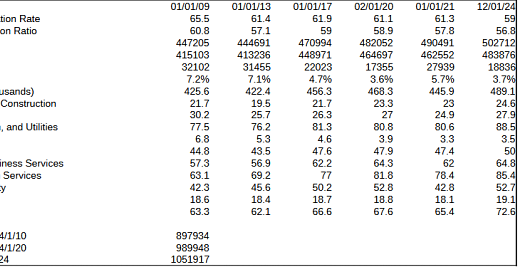A deep dive into Delaware employment (part 2 of 2)
In Part 1 I sliced and diced the numbers. Here's how I think we can improve them.
Part 1 is here if you want the numbers explained.
The way I see it, most private-sector job creation is value creation. Let me elaborate.
Almost every one of those numbers on the chart above added value to our economy. Let me count the ways:
Mining, logging, and construction take raw materials and process them into something useful, whether it’s a lump of coal that becomes a little bit of electric power, a tree that’s cut down to become a plethora of 2x4’s, plywood, and other wood products, or the people who built your house.
Similarly, manufacturing takes raw material and makes it into something useful - anything from a laptop to a truck to a flyswatter and myriad items in between.
Trade, transportation, and utilities both bring you the items you can’t secure locally (like fresh strawberries in February) and the power to be able to enjoy them.
Information is the processing of ideas into action, whether directly or indirectly.
Financial activities are more of a pencil-pushing job, but the insight gained with experience can be useful in avoiding market pitfalls. Good advice on investment can juice many of the other job classifications.
Professional and business services have a certain expertise that allows others who don’t have those skills to utilize the ones they do have in a better manner.
Education and health services are the teachers and doctors of the world, without whom we would be dumb and sick, generally at the same time. Good ones in each category are worth their weight in gold.
Leisure and hospitality create the good life and enjoyable moments.
Those who provide other services are the ones who can do those things we can’t or won’t do. There are a lot of unique skillsets involved in that category which you may only need once in your life, but you’re glad it’s there.
And finally we have government. Done correctly it can be a value-added service but too often they’ve been there only to extort from the producers to give to the favored constituencies.
I’m going to tell you right now that my expertise is not in economics; however, I believe my logic in this is relatively sound. There are things we can do to add great value to our overall economy and things which have been done to take that value away.
But there is one very important category missing from the above, and that’s agriculture. (The numbers are for nonfarm jobs, which makes sense because farm jobs are rather cyclical.) Obviously that is a value-adding skill that takes a little bit of luck as well. But, through the grace of God, we have people around here who make their living turning scrawny little chicks barely out of the shell into a roaster capable of feeding a family of four in a matter of weeks. In doing so, they keep those who grow grain in business, those who transport both the birds and the grain (as well as the “by-product”) and many other jobs in this area. (Sussex County, where I live, is considered the top broiler producing county in the nation.)
So we can’t ignore that aspect of employment when looking at how to fix what ails Delaware. While farmers are considered the bad guys by government-affiliated environmentalists, the truth is they don’t want to fowl their nest any more than anyone else does. (No pun intended.) And let’s put it this way: with nearly 60 chicken houses within a mile radius of me, I don’t want them to either.
What Delaware should be focusing on is gaining jobs that add a lot of value. Traditionally, that’s been in manufacturing but large plants will tend to stay away from closed shop states, so a good idea to me would be to allow Delaware to be a right-to-work state. (That doesn’t mean unions are banned, but they have to work to explain their benefits to the rank-and-file, to keep them more honest.)
And if we can keep our tourism and hospitality industry going by making the state more attractive to vacationers, that would be a plus as well. So no ugly wind turbines offshore, please. (Yes, cargo ships pass through but they don’t stay.)
The thing Delaware needs to do in general is look at what other successful states are doing. Obviously we’re no Texas or Florida because we don’t have the climate, natural resources, or sheer size to be those states, but there are things they indeed do right that we could emulate.
And just as importantly, we need job creators to represent us in our government because they understand what it’s like to be a maker and not a taker. I’m not saying they should make a second career out of it but there are places where their input would be welcome. (In the last election, Delaware had a chance to have a business owner as its governor but instead chose a teacher and attorney. That’s been part of its problem over the last thirty years.)
Like I said, I’m no degreed economic expert, but what I do know is that less government entanglement generally provides better economic results.
In more specific terms, though, the biggest assistance can’t come until 2026 and 2028. Breaking up a Democrat trifecta would really help since they’re the ones who got us into this situation and their former pro-business tendencies seem to have been lost in the national Democrats’ general move to the left.
Programming note: Normally I put an odds and ends on the last Saturday of the month but I forgot February was so short. So you get two in March as I do one of them next week.
In the meantime, though, you can Buy Me a Coffee, since I have a page there now.





